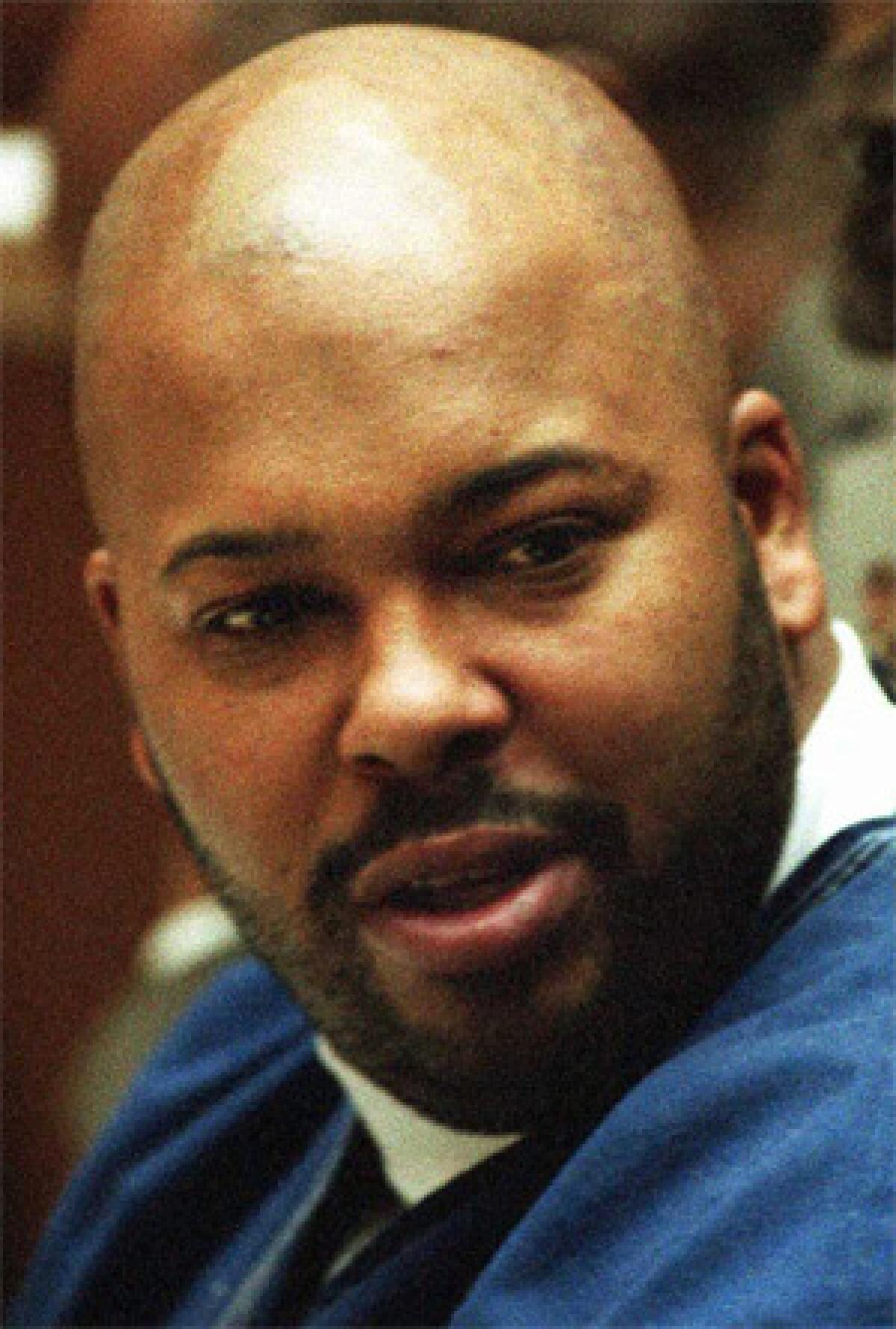‘Suge’ Knight to be freed from jail

- Share via
Rap mogul Marion “Suge” Knight will be released from jail this morning after a state prison panel dismissed four of the five alleged parole violations that authorities cited when they arrested him two months ago.
The California Board of Prison Terms ruled Tuesday that Knight violated his parole on only one count, by affiliating with a gang member, and gave him credit for 61 days already served. He will also be required to complete 200 hours of community service.
Knight could have received a year in prison.
“After reviewing all of the facts, we made the decision we believe needed to be made,” said Bill Sessa, a spokesman for the California Board of Prison Terms.
The decision followed a closed seven-hour hearing at the Los Angeles County Jail in which a panel of three deputy commissioners reviewed evidence and testimony from 10 witnesses. In the end, the panel sided with arguments presented by Knight’s attorneys, David Z. Chesnoff and Rose Kogeman.
“Suge is thrilled,” Chesnoff said. “We appreciate the amount of due process that was afforded Mr. Knight. His release lends credibility to the parole system.”
Initially, the prison board refused to allow Knight’s attorneys to attend the hearing, saying that as a parolee, Knight had no right to representation. But the board eventually reversed itself and allowed the attorneys to make their argument.
Knight was taken into custody two days before Christmas during a routine visit to his parole office. Authorities picked him up a few weeks after sheriff’s deputies raided his homes and businesses, collecting evidence of alleged parole violations.
Sheriff’s detectives said Knight had violated his parole by associating with gang members, residing at an address unknown to his parole officer, and had hired a driver who carried an unauthorized weapon. Authorities said they had confiscated photographs of Knight posing with known criminals and making gang hand signals at several parties.
Under the conditions of his parole, Knight is not allowed to associate with gang members.
The parole stemmed from two earlier incidents. In 1992, Knight was convicted of assault and federal weapons violations and was placed on probation. In 1996, he was jailed for five years for violating probation after he and several associates, including rap star Tupac Shakur, were recorded on videotape beating a gang rival in the lobby of a Las Vegas hotel. Three hours later Shakur was fatally shot on the Las Vegas Strip. Knight was wounded.
On Tuesday, detectives and parole officers testified that Knight violated those parole conditions by employing gang members who police believe are connected to a series of recent shootings. Several of those gang members are now in custody, charged with several attempted murders.
During his testimony Knight denied allegations of involvement with gang members, except, he said, in the course of his music label business.
At the hearing, other witnesses, including the Rev. Cecil Murray of the First AME Church in Los Angeles, testified that Knight had built his company, now called Tha Row, by employing ex-cons from his hometown of Compton. Murray said Knight also helped impoverished families through charitable contributions.
Richard Schoenfeld, an attorney from Chesnoff’s law firm, testified that he had met with the parole office after Knight’s release from prison in 2001 and was assured that hiring former gang members did not pose a problem -- as long as Knight did not hang out with them after work.
A professional photographer named Steven Williams told commissioners that he was hired by Knight to take the photographs that authorities cited. He testified that the photographs were taken at a Las Vegas concert in which Knight was shooting a music video featuring rappers making West Coast hand signs.
The panel ruled Knight had violated his parole on only one occasion, April of last year. The board said Knight should not have driven his employee Timmy “Timmy Ru” McDonald, an alleged gang member, to the hospital to visit McDonald’s brother, Alton, who had been wounded earlier that day in a drive-by shooting and later died.
Knight argued he had tried only to help the relative of his best friend and former employee, Alton McDonald, with the hope that he was still alive. Police stopped Knight’s vehicle as he left the hospital parking lot.
“Mr. Knight was only allowed to associate with Mr. McDonald at work and was not allowed to drive him after work to the hospital,” board spokesman Bill Sessa said.
“That was a violation. In the future, most of the community service that Mr. Knight will be required to do is aimed at gang abatement, that is, persuading other people not to get involved in gangs.”
More to Read
Sign up for Essential California
The most important California stories and recommendations in your inbox every morning.
You may occasionally receive promotional content from the Los Angeles Times.













